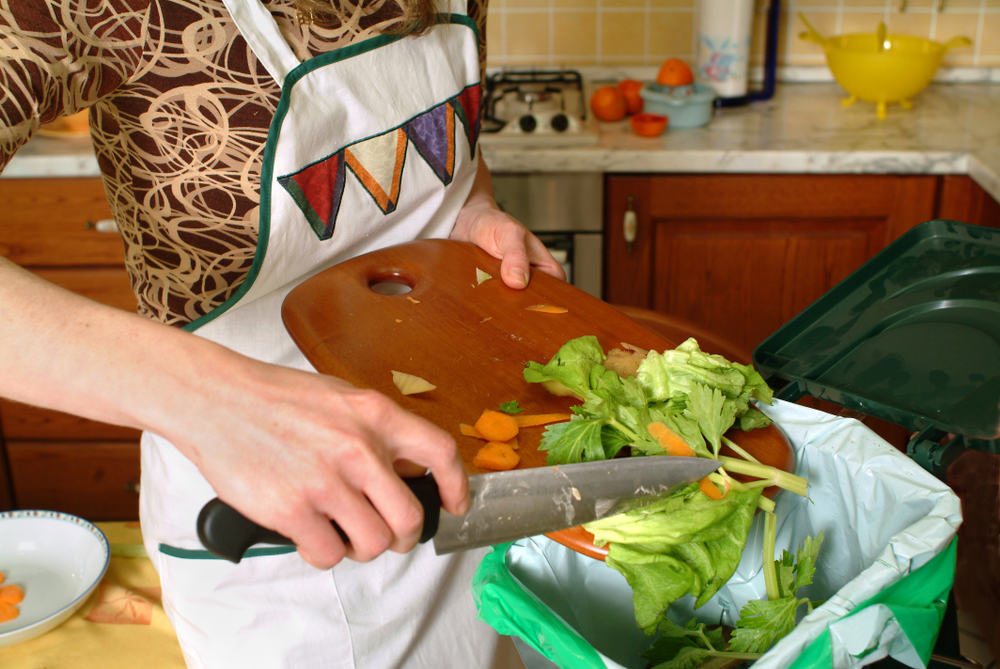
Stop! Don’t Throw It Out
Written by Ellen Frank Bayer
My father, Leon Frank, survived the Nazis by hiding in the forests of Poland and living on potato peels, wild mushrooms, berries and beans. He never imagined the food scraps he ate would save his life.
In today’s world, we are literally throwing away the best parts of the foods we eat. Here are ten tips to save those food scraps, and make our meals more nutritious and exciting:
1. Banana peels: Excellent for moisturizing your skin. You can also rub the white part of the peel on your houseplants to shine them and repel dust. Once you’re done cleaning and polishing the leaves, stick the peel in a jar of water and let it soak for a few days. Water your plants with the “banana water” for a well-deserved boost of calcium.
2. Squash: Acorn squash is a beautiful vegetable. The deep orange color looks festive stuffed with quinoa, rice, cranberries or wheat berries. Don’t throw away those seeds. Toast a few, add some olive oil and salt and pepper. Nosh on the seeds while you are preparing dinner. They are low in calories and packed with antioxidants, iron, zinc and magnesium. If you have a garden, plant the seeds and wait for them to flower (but don’t toast them first). The beautiful orange flowers are healthy and nutritious. You can stuff them with rice or just use them to embellish your salad. You can also steep them in hot water and add them to your tea. Just remember to take out the stamens before you eat them!
3. Weeds: Those pesky dandelions in your front yard make delicious additions to your salad. Do you have wild onions growing in your yard?
These plants look like scallions but are thinner
and shorter. They are also edible. Replace the onions in your recipes with wild onions for a more mild version of onion and better tasting foods!
4. Citrus peels: Citron Tea is a delicious tea containing jelly that is made from citron rinds. It originated in Korea but is very popular in Asian neighborhoods in the United States. Etrog peels may be used to make this jelly, however, it is highly recommended not to eat your etrog unless it was organically grown. According to Green Prophet.com it is not safe to eat etrogim. An excellent substitute is Meyer lemons. Peel the lemon with a vegetable peeler, just peel the rind without the pith (white matter inside the peel). Place the peels in a jar and add an equal amount of sugar. Store in the jar for about three days. Turn it once each day. The peels will dissolve and become jelly. Combine the jelly with the pulp of the fruit. This mixture can be added to tea with some fresh ginger to make a soothing, delicious hot drink.
5. Leftover beans, uneaten roasted vegetables, wilted celery, soft carrots can all be made into a delicious, heart-warming vegetable soup perfect for the long winter ahead.
6. Use all your vegetable peels, tops and ends to make a stock. Store the celery ends, carrot tops, broccoli stalks and cauliflower bottoms in a bag in the freezer. When you have some time,
boil a large pot of water on the stove, add the scraps and let it simmer. Use the water for vegetable stock. It will save you some money and add an extra boost of flavor to your soups. With the busy fall and winter seasons ahead, this is a great tip for saving money.
7. Eggshells: Save eggshells and crush them up. Add them to your plants for some quick fertilizer.
8. Coffee grinds: Combine coffee grinds with the eggshells and add to your plants.
9. Potato peels: Salt them, spray with olive oil and bake them for a few minutes at 450 degrees F. They make delicious chips. You can also do this with sweet potato peels, or carrot and parsnip peels. Use parchment paper for easy cleanup.
10. Watermelon rinds: You can pickle, stir fry and even juice them. Just like potato peels, the rind has more nutrients than the delicious red flesh. For some quick recipes, look at Watermelon.org: Three Ways to Eat Watermelon Rind.
“Don’t waste food, children are starving somewhere”. How many times have you heard a grandparent or parent say that? My dad survived the war with most of his teeth intact, a major accomplishment considering he was living near starvation for six long years. We don’t have to wait until our lives are threatened to reap the benefits of all the gifts of nature.
Related Articles
Related
Help! I’m Bored
Ouch, I walked into the open closet door. The green and yellow Sprite bottle was sticking out of the bulging recycling bag. How many times must I ask my children to return the bottles? It’s summer, it’s raining, and the pool is closed. My three children are looking at...
Fun Upcycling Ideas & Projects
Repurposing, upcycling, recycling - whatever you want to call it, finding a new use for something that would otherwise end up in a landfill or dump is a great way to do your part to reduce waste in your community. There are hundreds, if not thousands, of websites...
7 Makeup Brands That Are Cruelty-Free
High-End, Luxury, Moderate, Vegan Options, New on Market. Concerned consumers are looking beyond the familiar brands of yesterday. Here’s why. Kindness and compassion may be trending today, but they’ve always been core values in Judaism. Although other humans...
